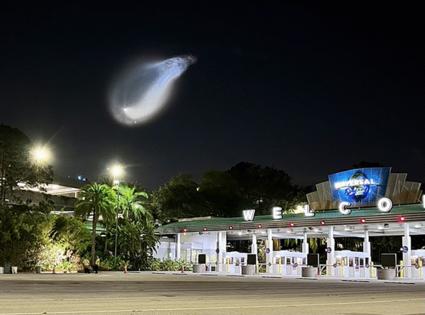Sunset SpaceX launch tonight could make for unique show if weather allows
Published in News & Features
A SpaceX launch on the Space Coast just after sunset Monday could mean the return of the unique jellyfish effect over Florida’s skies.
A Falcon 9 rocket on the Nusantara Lima mission carrying an Indonesian communications satellite to geosynchronous transfer orbit is set to lift off from Cape Canaveral Space Force Station’s Space Launch Complex 40 during a 116-minute window that opens at 8:02 p.m.
Sunset is set for 7:35 p.m., but the rocket’s path into space means its plume will catch the dipping sun rays with its exhaust trail potentially lighting up into what is often described as resembling a jellyfish in the night sky.
The phenomenon occurs when launches occur near sunrise or at twilight so the sun’s rays catch particles from the rocket contrail and create a bloom of blue and orange colors.
Space Launch Delta 45’s weather squadron, though, forecasts only a 30% chance for good conditions at the opening of the window Monday, which will improve to 45% by the end of the window. The same weather conditions are forecast if delayed until Tuesday during a similar launch window that opens at 8:01 p.m.
The first-stage booster for the mission is making its 23rd flight and will aim for a recovery landing downrange on the droneship A Shortfall of Gravitas stationed in the Atlantic.
This would be the 77th launch of the year from the Space Coast from all launch providers, with all but four coming from SpaceX.
SpaceX has at least one more launch already slated for this week when a Falcon 9 on the NG-23 mission with a Northrop Grumman Cygnus spacecraft is set to fly on a resupply trip to the International Space Station from Canaveral’s SLC-40 targeting Sunday liftoff at 6:11 p.m.
That flight also looks to bring its first-stage booster back for a landing at Canaveral’s Landing Zone-2, meaning Central Florida could be in for a sonic boom.
United Launch Alliance isn’t slated to fly again until Sept. 25 when an Atlas V looks to take up another batch of Amazon’s Project Kuiper satellites on what would be its fourth mission of the year.
Blue Origin, meanwhile, is targeting as early as Sept. 29 for the second ever flight of its heavy lift New Glenn rocket on a mission to send a couple of satellites to Mars for NASA.
------------
©2025 Orlando Sentinel. Visit at orlandosentinel.com. Distributed by Tribune Content Agency, LLC.







Comments